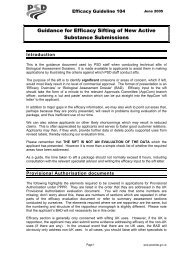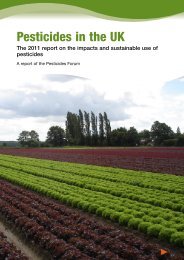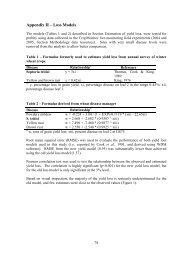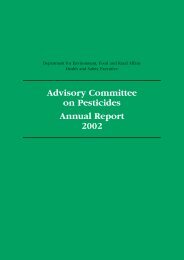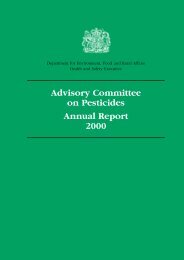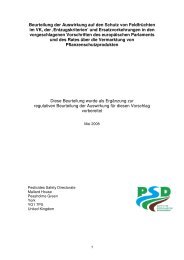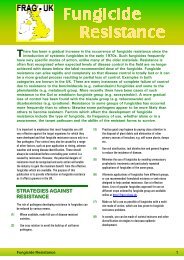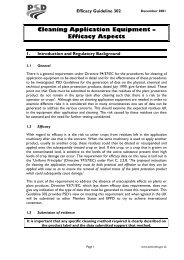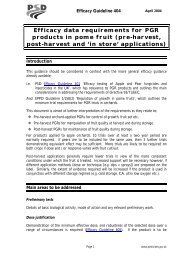Advisory Committee on Pesticides Annual Report 2001
ACP Annual Report 2001 - Pesticides Safety Directorate
ACP Annual Report 2001 - Pesticides Safety Directorate
You also want an ePaper? Increase the reach of your titles
YUMPU automatically turns print PDFs into web optimized ePapers that Google loves.
<str<strong>on</strong>g>Advisory</str<strong>on</strong>g> <str<strong>on</strong>g>Committee</str<strong>on</strong>g> <strong>on</strong> <strong>Pesticides</strong> <strong>Annual</strong> <strong>Report</strong> <strong>2001</strong><br />
of <strong>Pesticides</strong> Regulati<strong>on</strong>s 1986 (COPR). A commodity substance is not sold or<br />
advertised as a pesticide product in this c<strong>on</strong>text and there are no approval holders.<br />
Methyl bromide manufacture is currently restricted under the M<strong>on</strong>treal Protocol,<br />
which envisages a phased withdrawal leading to a world-wide ban.<br />
The <str<strong>on</strong>g>Committee</str<strong>on</strong>g> c<strong>on</strong>sidered a brief evaluati<strong>on</strong> of informati<strong>on</strong> submitted by<br />
interested parties to address data requirements set previously by the ACP<br />
for support of commodity substances.<br />
6<br />
In additi<strong>on</strong> to the data reported, the <str<strong>on</strong>g>Committee</str<strong>on</strong>g> noted that studies performed in<br />
France and the USA suggested that neurobehavioural effects could result from<br />
repeated occupati<strong>on</strong>al exposure to methyl bromide. The <str<strong>on</strong>g>Committee</str<strong>on</strong>g> also c<strong>on</strong>sidered<br />
that methyl bromide was likely to be genotoxic although it was not aware of any<br />
cytogenetic studies in exposed populati<strong>on</strong>s. However, it noted that methyl bromide<br />
was required to be used under strictly c<strong>on</strong>trolled situati<strong>on</strong>s in compliance with an<br />
Approved Code of Practice (ACOP) for fumigati<strong>on</strong>. Fumigati<strong>on</strong>s were carried out<br />
by a small number of dedicated c<strong>on</strong>tractors who had in place good standards of<br />
training and supervisi<strong>on</strong>. The <str<strong>on</strong>g>Committee</str<strong>on</strong>g> c<strong>on</strong>sidered that the strict engineering<br />
c<strong>on</strong>trols and requirements for pers<strong>on</strong>al protective equipment that were currently in<br />
place in the UK would mitigate exposure and minimise the risks to workers. Given<br />
these c<strong>on</strong>trols, the small number of highly trained professi<strong>on</strong>al workers involved,<br />
the low level of incidents involving methyl bromide over the last 10 years and the<br />
rarity of claims for occupati<strong>on</strong>al injury by methyl bromide, the <str<strong>on</strong>g>Committee</str<strong>on</strong>g> agreed<br />
that there was no pressing need for further data to refine the risk assessment if<br />
methyl bromide was to be phased out by 2005.<br />
The <str<strong>on</strong>g>Committee</str<strong>on</strong>g> noted that there was a provisi<strong>on</strong> to allow essential uses of<br />
methyl bromide to remain bey<strong>on</strong>d 2005, but that it was not yet clear what these<br />
might be. It c<strong>on</strong>sidered that when methyl bromide was phased out under the<br />
M<strong>on</strong>treal Protocol, it would lose its approval as a commodity substance and any<br />
c<strong>on</strong>tinued essential use as a pesticide after 2005 was likely to require specific<br />
approval. The <str<strong>on</strong>g>Committee</str<strong>on</strong>g> briefly discussed alternatives to methyl bromide such<br />
as hydrogen cyanide, but c<strong>on</strong>sidered that, depending <strong>on</strong> the circumstances and<br />
the area of use, these might not be particularly suitable replacements.<br />
The <str<strong>on</strong>g>Committee</str<strong>on</strong>g> agreed that the data requirements set previously by the<br />
ACP had been addressed adequately and that currently there should be no<br />
requirement for any further data. It noted the need to identify any essential<br />
uses that might remain bey<strong>on</strong>d 2005, the users who would require them,<br />
and the administrative arrangements by which uses would be classified as<br />
essential. The <str<strong>on</strong>g>Committee</str<strong>on</strong>g> agreed that, depending <strong>on</strong> the answers to these<br />
questi<strong>on</strong>s, more data might be required to support remaining uses.




